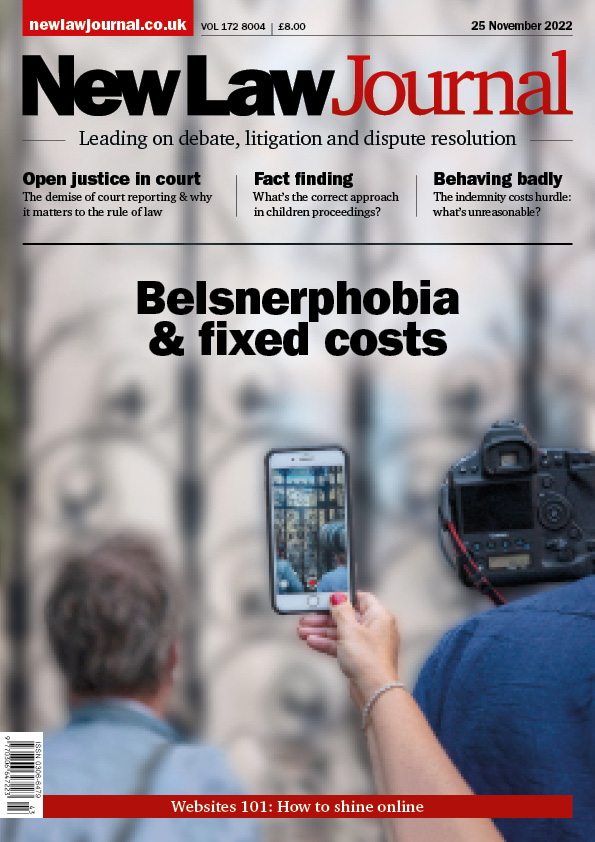THIS ISSUE

NLJ columnist Jon Robins takes a look in this week’s issue at the recent Justice Committee report, 'Open justice: court reporting in the digital age', which revealed troubling truths about accountability and transparency in the justice system.
How high a hurdle must be cleared before a court will grant indemnity costs on the basis of unreasonable conduct? Writing in this week’s NLJ, Masood Ahmed, University of Leicester and Lal Akhter, Med Chambers, Leicester, tackle this important question.
In the first of a two-part NLJ series on fact-finding hearings, Sarah Hughes, partner, and Victoria Rylatt, senior associate, Anthony Gold, look at some of this year’s key cases. These cases have grappled with difficult issues but provide extremely useful guidance, the authors write.
With economic storm clouds brewing, lawyers need to identify where they are exposed and how best to mitigate any weak spots.
With his front-row seat to the latest announcement on fixed costs, Professor Dominic Regan is well-placed to forecast what comes next, in this week’s NLJ.
Jon Robins charts the demise of media reporting from the courts & the impact on transparency in the justice system
Dominic Regan sees February and October in the fixed costs tea leaves, predicts Belsnerphobia in Wolverhampton, and shares the joy of swag
Sarah Hughes & Victoria Rylatt set out recent case law on fact-finding hearings in private children proceedings
How to tell who is telling the truth? Theo Huckle KC sets out some valuable guidance from the courts on assessing a witness’s honesty
Portal welcomes counsel; charity relaxations; Wales wins in extra time; Mostyn J overcomes authority; Parliament tough on CPR.
MOVERS & SHAKERS

Carey Olsen—Kim Paiva
Group partner joins Guernsey banking and finance practice
.tmb-mov69x69.jpg?sfvrsn=16d9dd3d_1)
Morgan Lewis—Kat Gibson
London labour and employment team announces partner hire

Foot Anstey McKees—Chris Milligan & Michael Kelly
Double partner appointment marks Belfast expansion
NEWS
The Ministry of Justice (MoJ) has not done enough to protect the future sustainability of the legal aid market, MPs have warned
Writing in NLJ this week, NLJ columnist Dominic Regan surveys a landscape marked by leapfrog appeals, costs skirmishes and notable retirements. With an appeal in Mazur due to be heard next month, Regan notes that uncertainties remain over who will intervene, and hopes for the involvement of the Lady Chief Justice and the Master of the Rolls in deciding the all-important outcome
After the Southport murders and the misinformation that followed, contempt of court law has come under intense scrutiny. In this week's NLJ, Lawrence McNamara and Lauren Schaefer of the Law Commission unpack proposals aimed at restoring clarity without sacrificing fair trial rights
The latest Home Office figures confirm that stop and search remains both controversial and diminished. Writing in NLJ this week, Neil Parpworth of De Montfort University analyses data showing historically low use of s 1 PACE powers, with drugs searches dominating what remains
Boris Johnson’s 2019 attempt to shut down Parliament remains a constitutional cautionary tale. The move, framed as a routine exercise of the royal prerogative, was in truth an extraordinary effort to sideline Parliament at the height of the Brexit crisis. Writing in NLJ this week, Professor Graham Zellick KC dissects how prorogation was wrongly assumed to be beyond judicial scrutiny, only for the Supreme Court to intervene unanimously







